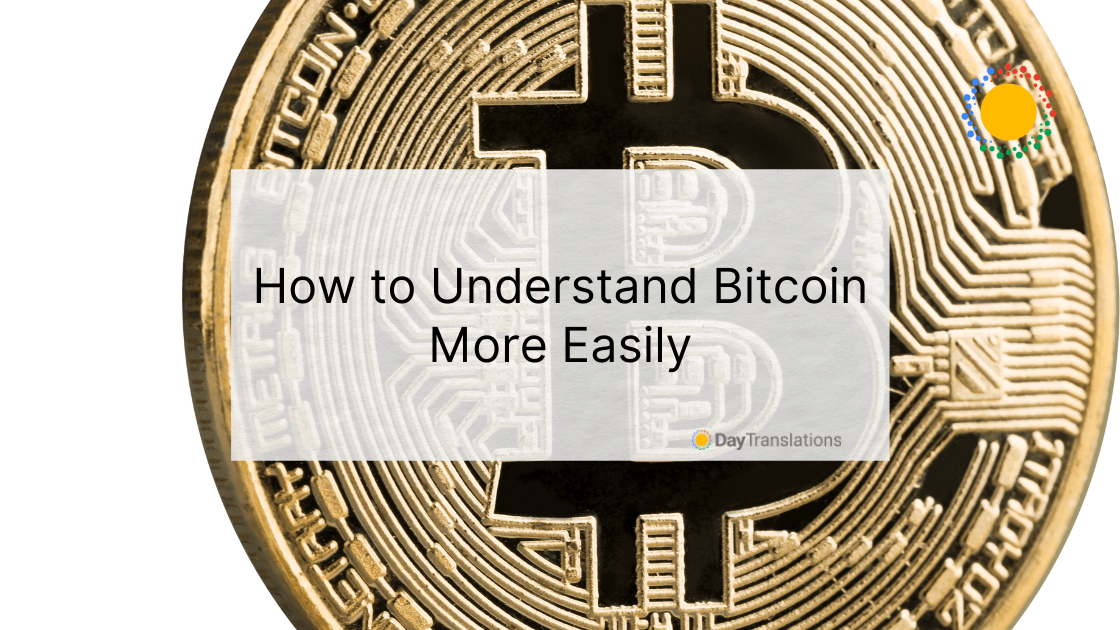There’s no doubt that bitcoin is a hot topic. There’s barely a day without news about bitcoin, especially with what’s been happening with its price recently. That’s why even translators and language enthusiasts get the urge to dip their toes in it, wittingly or unwittingly. So how do translators understand bitcoin and cryptocurrency in general? How do people with an excellent grasp of languages perceive and explain bitcoins?
Cryptocurrencies are like languages
There are some similarities between cryptocurrency and language. There are many cryptocurrencies, in the same way, there are many languages used by different people in different parts of the world. For language to become effective, people need to commonly know how to use it.
People who only know English can only communicate with people who also know how to use English. Similarly, people who only use bitcoins can only transact with others who also use bitcoins. In using cryptocurrency, users need to use a “wallet” to transfer, receive, and keep funds. This wallet and the knowhow in using it is like the knowledge of a specific language. It only works among people who use the same system. If you want to interact with others who use a different system, you would need a “translator.”
Cryptocurrencies can also be compared to languages in their development, management, and the setting of rules. Governments are usually not involved in these processes. Languages generally develop organically, upon the consensus of users. Governments may identify the languages that can be considered as the national or official languages but they usually don’t dictate how languages, especially those being used by several countries, develop or change. This is similar to what happens with cryptocurrencies. They generally emerge and grow because of users. Governments only get involved at a later instance.
Bitcoin is like the English language
Bitcoin can be compared to the English language. It is the most well-known cryptocurrency in the same way English is the most well-known language in the world. Even those who use other cryptocurrencies are interested to learn and understand bitcoins and to take advantage of what is happening with it. Cryptocurrency enthusiasts particularly keep track of movements in bitcoin price.
Like the English language, bitcoin is a dominant presence among cryptocurrencies and appears to impact developments in other cryptocurrencies. Bitcoin may not be the origin of cryptocurrency but many cryptocurrencies have been derived from it or are inspired by it.
On the other hand, variations of the English language can be compared to bitcoin forks. A bitcoin fork is basically the creation of a new cryptocurrency because of a major change in the underlying software of a cryptocurrency. Bitcoin has undergone a number of forks that resulted in new cryptocurrencies like namecoin, bitcoin cash, and bitcoin gold. These are cryptocurrencies are different from bitcoin but are using the same core system. They’re comparable to the different variants and accents of the English language (British, American, Australian, etc). They appear or sound different but they are based on the basic English vocabulary, syntax, morphology, semantics, and rules.
Bitcoin exchanges are like translators
As mentioned, bitcoin cannot be directly transacted with other cryptocurrencies or with fiat currencies. You cannot send bitcoins to a Namecoin or Litecoin wallet. Likewise, you cannot send bitcoins to a PayPal account or other e-wallets unless these wallets support bitcoin balances. To enable interoperability, you need to go through Bitcoin exchanges. Bitcoin exchanges allow you to exchange your bitcoins for other cryptocurrencies as well as fiat currencies. It’s like foreign exchange but with support for cryptocurrencies.
Just like translation services, it’s important for Bitcoin exchanges to be reliable and accurate. Mistakes or anomalies can lead to unwanted or even dire consequences. Translators need to be accurate to ensure proper understanding in the same way bitcoin exchanges should be dependable for users to trust them. The operation of Bitcoin exchanges, however, are more critical because problems in them (hacking or stolen bitcoins for example) can affect bitcoin price.
It’s not necessary to learn the technicalities
No one is born readily capable of using a language. It takes time learning one but the process is usually instinctive. It’s the same with using cryptocurrency, you may think it’s complicated to use but you’ll be surprised how easy using it is. You get to learn it as you learn from those around you. This learning is mostly just about the practical aspects of it, though. It’s unnecessary to know the technical details. Similar to what happens when using language, you don’t really need to know about etymologies, semantics, and advanced rules to use language. The basics mostly suffice and you get to know more by interfacing with others who know the language.
With cryptocurrency, as long as you know how to use a cryptocurrency wallet and you know the basics of securing it, you can consider yourself knowledgeable enough in using cryptocurrency. You don’t have learn how cryptography is employed to create bitcoins and process transactions. There’s no need to understand bitcoin and how it operates as a decentralized currency. You don’t have to deeply understand how bitcoin mining works to mine bitcoins. You just have to get the right Bitcoin mining software and hardware and proceed to mining. It’s unnecessary concern yourself with the technical aspects of a bitcoin fork. It’s enough to simply know the policies and understand bitcoin exchanges with regards to upcoming forks to know how these would affect your bitcoins and properly decide on what should be done.
The point here is becoming a bitcoin user is different from becoming a bitcoin expert who can eloquently explain and understand bitcoin or cryptocurrency in general to other potential users. It’s like how different becoming fluent in English is from getting a PhD in English Language and Literature.
However, you need to be smart with how you use both language and bitcoins. You may not need to be well versed with the technical details but you have to be familiar enough to evade trouble or problems. When using language, you have to be careful with your words to avoid offending others and to be clear with your intentions. You need to have enough fluency so you wouldn’t end up signing misleadingly-worded contracts, believing fake news, or wrongly following instructions. With bitcoins and cryptocurrency, you need to know enough not to fall for “bitcoin investment” scams on the Internet. You need to know enough about securing your Bitcoin wallet.
Uppercase or lowercase “B”: How is Bitcoin spelled?
Perhaps, for a translator, a bitcoin question that is of greater importance than the technical details is on how to spell bitcoin. Should it be spelled with the capital letter “B” or should it be treated in the same way dollar, euro, yen, and other currencies are treated? The answer to this question lies on how the word is used. Bitcoin can refer to a cryptocurrency or a protocol/payment network. The consensus is that when referring to “bitcoin” as a cryptocurrency, it has to be spelled with a lowercase “b” in the same way currencies are spelled. The uppercase “B” spelling is to be used when referring to the protocol and payment network.
Here are some sample sentences to help clarify this:
- Do you know that Bitcoin lets you make anonymous payments?
- I already sent .5 bitcoin for the purchase I made yesterday.
- My Bitcoin wallet is empty, can you send me some bitcoins?
How do bitcoins get their value?
How come bitcoins are considered valuable when they’re merely a digital creation and presence? Are they backed by gold, silver, or some other valuable asset? Do bitcoins come with corresponding fiat currency held in banks? The common answer to these questions is no. Just like the US dollar and most other currencies after the abolition of the gold standard, bitcoin is not backed by anything. Its value arises from the consensus of users. It is valuable simply because users deem it valuable, because there are users who acknowledge that bitcoins have value. It’s because they are being used as a medium of exchange and can be converted into other currencies through Bitcoin exchanges.
It’s similar to what happens with language. A language is established because of the acknowledgment and use of its users. It grows and becomes more valuable as more people use it, and as additions and improvements are introduced to it. Bitcoin or cryptocurrency value is created upon the understanding and agreement of users. New cryptocurrencies can emerge and become valuable when more people use them.
Bitcoin value, by the way, is different from bitcoin price. The former is about the perceived utility of bitcoins in general while the latter refers to the equivalent of bitcoin in fiat currency, especially in reference to the US dollar.
In summary: A concise explanation of bitcoin
Here’s an attempt to explain Bitcoin in the simplest of terms through bullet points:
- Bitcoin is a digital currency. It does not have a physical presence.
- Bitcoin is not backed by gold or other assets but it is valuable because users consider it as such. If users decide to stop using bitcoin altogether, it will lose all of its value.
- Bitcoin price (the equivalent of bitcoin in fiat currency such as the US dollar) is determined by supply and demand. You don’t have to know the details of this supply and demand correlation. It’s enough to understand bitcoin price is set by Bitcoin exchanges. Different bitcoin exchanges may have slightly different bitcoin prices.
- To use bitcoins, you need to have a Bitcoin wallet. There are many different wallet options to choose from. The process of setting up a wallet depends on the wallet you choose.
- Once you have a Bitcoin wallet, you can receive and send bitcoins. Refer to the usage guide for the specific Bitcoin wallet you chose.
- You can get bitcoins through bitcoin mining (using a special bitcoin mining software) or by buying them from a Bitcoin exchange or from those who have bitcoins in their Bitcoin wallets (and are willing to sell them).
- You can use bitcoins to buy items at stores, online or offline, that accept bitcoin payments.
- You can exchange your bitcoins with fiat currencies such as dollar, euro, or pound through Bitcoin exchanges or by selling your bitcoins to those interested in buying them (with fiat currency as payment).
- Bitcoin transactions or the sending and receiving of bitcoins entail transaction fees. These transaction fees are usually paid for by the one sending the bitcoins. Transaction fees should be paid to ensure that the transaction is processed and verified. The transaction fees are the amounts used to pay bitcoin miners (those who do bitcoin mining) since these bitcoin miners are the ones responsible for solving the cryptographs (or highly complicated codes and mathematical problems) behind cryptocurrencies, and establishing the blockchains.
- If you were dragged to bitcoin because you heard it can get you big bucks, you have to realize it’s already late to have your “bitcoin investment.” Early adopters or those who have kept good amounts of bitcoins in their wallets are the ones who benefited from the bitcoin price surge in recent months. It may already be too late to make money with bitcoins as bitcoin price has already been dropping.
You don’t have to learn the technical details of Bitcoin to use it. Using it is not more difficult and complicated than using fiat currency through online banking or e-wallets. You basically just need to know is how to set up an account (set up a wallet), get and send funds, and properly secure your account. It can be an instinctive process similar to how you learn to use language.












Sorry, the comment form is closed at this time.